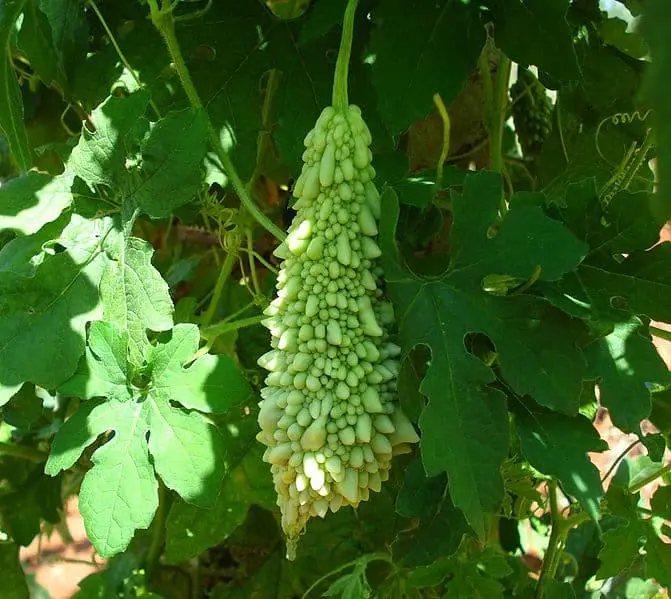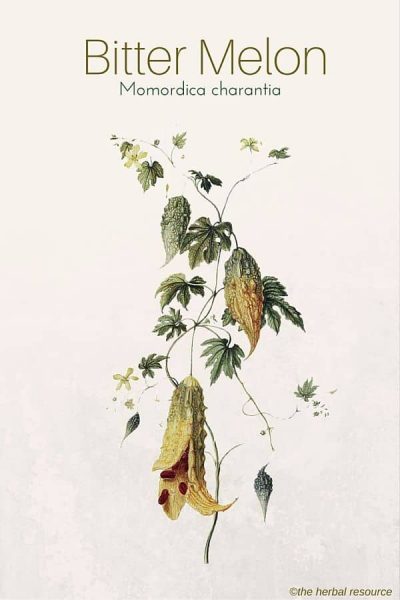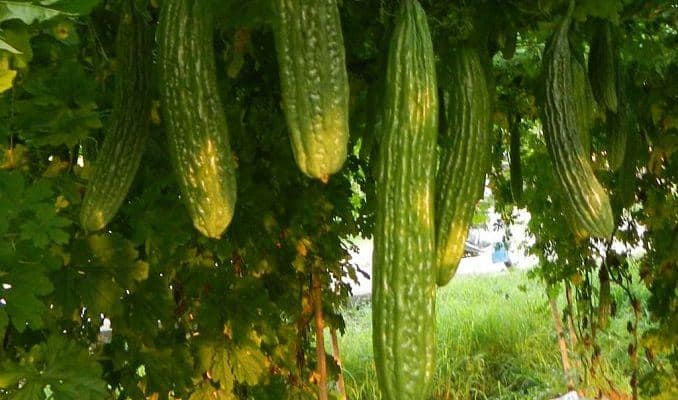Botanical Name: Momordica charantia.
Other Common Names
- Bitter gourd
- karela
- caraili
- cerasee
- papailla
- ampalaya
- balsam apple
- balsam pear
- pare.
Habitat
Bitter melon requires tropical conditions for growth and as such is found in parts of Asia, Africa, South America, and the Caribbean.
Plant Description
This tropical vine grows to about six to eight feet in height and each node on the vine has a lobed leaf and a tendril.
Bitter melon bears male and female flowers that are yellow in color and grow at the axils of the leaves. The fruit of the vine is oblong and with a rather rough exterior. When young, the fruit is green and contains white seeds and after maturity turns to orange-yellow with red seeds.
Plant Parts Used
Fruit, seed, leaf, vine.

Therapeutic Benefits, Claims, and Uses of Bitter Melon
In the Amazon, bitter melon is used in cooking and also as a medicine. The fruit and the leaves are added to beans or soups for producing a bitter or sour flavor.
As far as the medicinal uses are concerned, bitter melon has been used by the American natives for a long time as a treatment of diabetes; to prevent measles, hepatitis; to get rid of worms and parasites and the topical applications are used for healing wounds.
It is in fact used in many parts of South America for a wide range of ailments such as malaria, measles, skin problems just to name a few.
It is also used as an aphrodisiac and it is known for its anti-inflammatory effects.
In Asian countries, young fruits are used in cooking as they are rich in Vitamin A, Vitamin C, carbohydrates, and iron. (1)
In Jamaica, the leaves are used to prepare tea, which provides relief from spasmodic pains of the large intestine.
Though bitter melon has a wide array of uses, it has particularly attracted a lot of attention as a herbal treatment for diabetes.
Its effectiveness in this regard has been supported by clinical research and it is deemed a natural alternative to conventional drugs for treating diabetes.
Bitter melon consists of at least three different groups of constituents – charantin, insulin-like peptides, and alkaloids, which have the ability to lower the level of blood sugar in the system.
However, further research is needed to determine whether the three compounds work as a combination or if one constituent is more effective than the others. (2)(3)(4)
Bitter melon can also be used in the treatment of other conditions such as piles, blood disorders, respiratory disorders, cholera, and alcoholism.
Moreover, research is being carried out to study the effectiveness of bitter melon to fight HIV infections and certain types of cancer. (5)(6)

Dosage and Administration
A small fruit or alternatively, 60 ml of fresh juice can be consumed per day.
In order to avoid the bitter taste, it can be used in tincture form, in which case the recommended dosage is 5 ml take two or three times on a daily basis.
Side Effects and Possible Interactions of Bitter Melon
Though considered fairly safe to use, bitter melon should be used as prescribed by a health care physician. If consumed as per the recommended dosage, bitter melon is unlikely to cause any harmful side effects.
However, excessive intake can result in abdominal pain, diarrhea, nausea or a headache. The seeds are known to be particularly toxic.
People suffering from hypoglycemia should not consume bitter melon as it might make their condition worse.
Since bitter melon lowers the level of blood glucose, it can cause coma in those susceptible to hypoglycemia.
Those on anti-diabetic medication should be aware of the fact that the consumption of bitter melon may cause blood sugar levels from dropping below normal.
Also, it can adversely impact fertility in both men and women. Pregnant women should avoid bitter melon. (7)
Supporting References
- Dr. Basavaraj S Adi and Dr. Siva Rami Reddy E – Momordica charantia of phytochemical study: A review.
- Joseph, B., & Jini, D. (2013). Antidiabetic effects of Momordica charantia (bitter melon) and its medicinal potency. Asian Pacific Journal of Tropical Disease, 3(2), 93–102. doi:10.1016/S2222-1808(13)60052-3
- Ooi CP, Yassin Z, Hamid TA. Momordica charantia for type 2 diabetes mellitus. Cochrane Database of Systematic Reviews 2012, Issue 8. Art. No.: CD007845. DOI: 10.1002/14651858.CD007845.pub3.
- Habicht, Sandra & Ludwig, Christine & Yang, Ray-Yu & Krawinkel, Michael. (2014). Momordica charantia and Type 2 Diabetes: From in vitro to Human Studies. Current Diabetes Reviews. 10. 10.2174/1573399809666131126152044.
- Jia, S., Shen, M., Zhang, F., & Xie, J. (2017). Recent Advances in Momordica charantia: Functional Components and Biological Activities. International journal of molecular sciences, 18(12), 2555. doi:10.3390/ijms18122555
- Muhammad, N., Steele, R., Isbell, T. S., Philips, N., & Ray, R. B. (2017). Bitter melon extract inhibits breast cancer growth in a preclinical model by inducing autophagic cell death. Oncotarget, 8(39), 66226–66236. doi:10.18632/oncotarget.19887
- Basch, Ethan & Gabardi, Steven & Ulbricht, Catherine. (2003). Bitter melon (Momordica Charantia): A review of efficacy and safety. American journal of health-system pharmacy: AJHP : official journal of the American Society of Health-System Pharmacists. 60. 356-9. 10.1093/ajhp/60.4.356.
Thordur Sturluson
Latest posts by Thordur Sturluson (see all)
- What is the Difference Between Hemp and Marijuana? - June 3, 2019

Leave a Reply